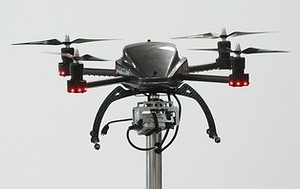From the Yes-We-Live-In-The-Future file we have the story of an unnamed Seattle woman who looked out her upper-floor window a couple of weeks ago to allegedly find an aerial drone hovering outside.
First, the situation, as recalled by the woman in the original story from my colleagues at the Capitol Hill Seattle blog:
This afternoon, a stranger set an aerial drone into flight over my yard and beside my house near Miller Playfield. I initially mistook its noisy buzzing for a weed-whacker on this warm spring day. After several minutes, I looked out my third-story window to see a drone hovering a few feet away. My husband went to talk to the man on the sidewalk outside our home who [sic] was operating the drone with a remote control, to ask him to not fly his drone near our home. The man insisted that it is legal for him to fly an aerial drone over our yard and adjacent to our windows. He noted that the drone has a camera, which transmits images he viewed through a set of glasses. He purported to be doing “research”. We are extremely concerned, as he could very easily be a criminal who plans to break into our house or a peeping-tom. [sic]
The woman refuses to provide any more details about this situation, including her name, but the story itself has enough to it that it’s easy to see where the conflict lies. The First Amendment protects the rights of citizens to collect data, and other laws provide that the air itself is free for all to use. Add in the concept of the expectation of privacy and we get arrive in a legal grey area that’s something new.
For example, a Supreme Court ruling in 1946 called the air above private property a “public highway”. But inexpensive HD camera-equipped hovering drones didn’t exist in 1946, so does this mean that access and privacy laws should be re-examined?
They likely will be, as the Supremes’ ruling applied to airplanes and other vehicles under FAA regulation, while these new remote controlled drones are regulated by little more than the FCC , which focuses on making sure the devices operate only on their licensed radio frequencies. The FCC, as of yet, has no authority on where these devices may roam or what they may see when they get there.
While some areas have regulations about where remote controlled aircraft may be operated, these small, lightweight, electric drones are usually exempt. If a 1.5-pound plastic quadro-copter did run into an overhead power transmission line, the drone would more likely suffer real damage than a 1.5-inch diameter wound copper wire.
The fate of the drone’s operator is still unknown, as he left the scene before the police arrived, but Seattle being Seattle — a city that’s already jittery over drones — means he’s likely not the only person to take up camera-sporting areal copters as a hobby. In addition, the line in the above quote regarding the drone being “a few feet away” from the woman’s window is subjective, because what’s a few feet? To someone overly concerned with their own privacy, twenty feet could be too close for comfort, but to others it might just be an annoyance.
Another unknown is exactly where the Drone’s camera was pointed, as the quote the woman gave in the original story lacks those details. But even if it was pointed into the woman’s home, she may not have the grounds for a civil or criminal case — or, then, she might.
Deborah Ahrens, an Associate Professor of Law at Seattle University School of Law, tells Forbes that, “The use of drones by citizens is unlikely to violate current criminal or civil law, even if the drone is flown over private property. If the drone is used to peer inside of a residence, it is possible that the resident would have a tort claim based on invasion of privacy, and in an extreme such case, it is possible that the person could be criminally prosecuted under a state peeping Tom statute.” In other words, it’s still a grey area until someone brings a situation like this one to trial.
This story may have nothing more to it, as we are unable to get more information about the woman or know the identity of the drone’s pilot. Or it may be the first spark to ignite another clash between privacy and technology. That could spur development of new tech-privacy laws – laws that we generally don’t even should exist until we find we absolutely need them.
Original article by Matt Hickey at http://www.forbes.com/sites/matthickey/2013/05/28/is-seattle-being-buzzed-by-drone-equipped-peeping-toms/


